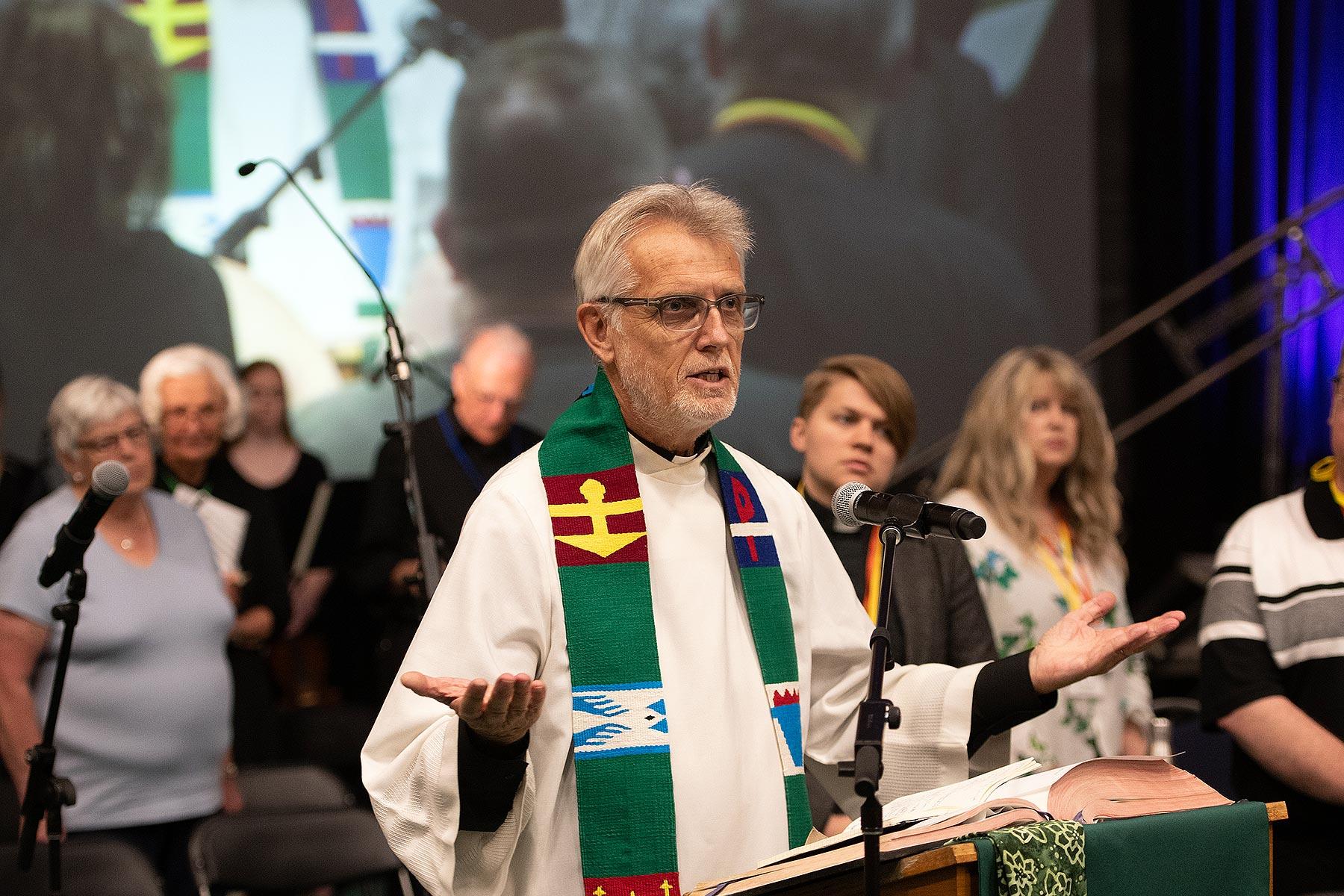The church belongs to the present and has a future

LWF General Secretary Rev. Dr Martin Junge participated in the opening worship of the National Convention of the Evangelical Lutheran Church in Canada and addressed the convention, offering greetings and insights from the LWF. Photo: ELCIC Communications.
“It is by making a difference that a church is big”
(LWI) - Churches flourish where people journey with each other, worshipping together, talking and listening to each other as they “gather and walk in Christ’s name,” the General Secretary of The Lutheran World Federation (LWF) Rev. Dr Martin Junge has said.
Addressing the 2019 National Convention of the Evangelical Lutheran Church in Canada (ELCIC) in Regina, Saskatchewan, on 12 July, the General Secretary said that in times “marked by profound change” which affects the LWF member churches and the communion as a whole, we should focus on the present and future in discerning ways of being church.
“The church has a past, but it doesn’t belong to the past. It belongs to the present and has a future, because of God. God continues making things new, on this very day, nurturing and guiding God’s people as they live their baptismal vocation in every-day life.“
Called to journey together
The ELCIC National Convention is meeting at the University of Regina under the theme “Called to Journey Together - the Ministry of Reconciliation”.
Commenting on the theme, Junge said that faith is a “profoundly dialogical” matter that only flourishes when people journey together. Junge expressed his appreciation for the ELCIC’s ongoing commitment and support for the LWF. “We in the LWF are deeply grateful for the ELCIC’s active, ongoing and meaningful participation in the life of the Lutheran communion.”
While reminding delegates from across Canada that the LWF includes 148 member churches in 99 countries with more than 75 million members, the LWF general secretary noted that God’s mission has never been about numbers.
This is particularly important to remember, Junge added, as some churches are growing rapidly while others see their number diminishing.
A church doesn’t have to be big in order to make a difference; it is by making a difference that a church is big.
“It has instead always been about the wonderful story of liberation, transformation and the promise of new life. No, dear friends, a church doesn’t have to be big in order to make a difference; it is by making a difference that a church is big,” he said.
Referring to the journey of churches in the communion, he invited “to grow into a new reality in which each church will always and at all times understand itself as one being both at the giving and the receiving end, learning from each other, and adding value to each other”
The original callings of the LWF heard in the aftermath of the Second World War – service, mission, theology and unity – are still shaping the worldwide Lutheran communion, however, new insights and commitments have deepened the communion’s journey, Junge emphasized.
Women in the ordained ministry
The General Secretary reminded of the commitment of the communion to move together “respectfully yet with determination towards the goal of the ordination of women into the ministry of the church” He emphasized the importance of this commitment in the context of ecumenical dialogues. “Women’s ordination is not up for negotiation; it is not on the table; but ordained women will be at the table as we discuss and discern with our dialogue partners. It is the gift we are able to share.”
Listening to youth as we plan for the future
An important commitment of the LWF is the use of quotas in governance structures so that the voices of women and youth can be better heard. “I look at quotas a as a true blessing”, he said. Referring to the 20% participation of youth in LWF’s governance structures he stated that it was because of the youth’ involvement that the LWF adopted a policy in 2015 not to invest in fossil fuels.
Encouraging the Canadian church to continue including youth he added:
“No church should plan for the future, without involving those who will inherit it: the youth present in the church today.”




